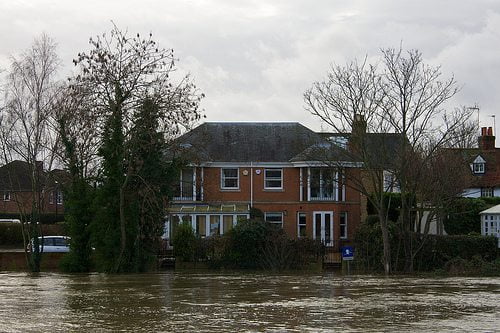

Economy
European flood losses could increase four-fold by 2050
Losses from extreme floods in Europe could soar over the next 36 years, as climate change and socioeconomic development have an impact. In addition, extreme events will also become more frequent.
The research, published in the journal Nature Climate Change, uses a new model to assess the cost of flooding across Europe. Researchers from the International Institute for Applied Systems Analysis (IIASA) estimated that in the European Union, flood costs averaged €4.9 billion (£4 billion) a year from 2000 to 2012. These losses could increase to €23.5 billion (£19.3 billion) by 2050, the study found.
Large events, such as the 2013 European floods, are also likely to increase in frequency, from an average of once every 16 years to a probability of once every 10 years by 2050.
Two-thirds of the increasing costs come from socioeconomic growth as development means more buildings and infrastructure are exposed to such damage. The remaining third will be a result of climate change, which is projected to affect rainfall patterns in Europe.
The researchers said the new study and model differs from previous research because it incorporates socioeconomic development and views rivers as a network rather than independent. “If rivers are flooding in central Europe, they are likely to also be flooding in eastern European regions”, they explained.
The increased risk will also place pressure on existing financing mechanisms as the European Solidarity Fund (EUSF) could be forced to pay out funds simultaneously across many regions.
IIASA researcher Stefan Hochrainer-Stigler, who led the modelling work on the study, said, “We need to reconsider advance mechanisms to finance these risks if we want to be in the position to quickly and comprehensively pay for recovery.”
The research follows extreme weather in the UK, which saw flooding across the south. A public poll found that almost half of UK voters believe the storms and floods were a result of climate change. David Cameron and the Met Office have also linked climate change with the extreme conditions.
In separate research, the UK was ranked among the countries were flooding poses the greatest risk to their economic output. High population density and the proximity of infrastructure and commercial and residential buildings to areas of flood risk led to the UK ranking seventh globally.
Further reading:
National Farmers’ Union: farming should be ‘higher priority’ in flood clean-up plans
HS2 could increase flood risk, MPs fear
UK flood: long-term water management requires ‘clear strategy’, say experts
Poll: 47% of Britons say floods are a result of climate change
Flooding poses risk to UK economy and could worsen with climate change


 Environment12 months ago
Environment12 months agoAre Polymer Banknotes: an Eco-Friendly Trend or a Groundswell?

 Features11 months ago
Features11 months agoEco-Friendly Cryptocurrencies: Sustainable Investment Choices

 Energy11 months ago
Energy11 months agoThe Growing Role of Solar Panels in Ireland’s Energy Future

 Energy12 months ago
Energy12 months agoHow Renewable Energy Can Help Combat Climate Change, According to Indra Energy


























